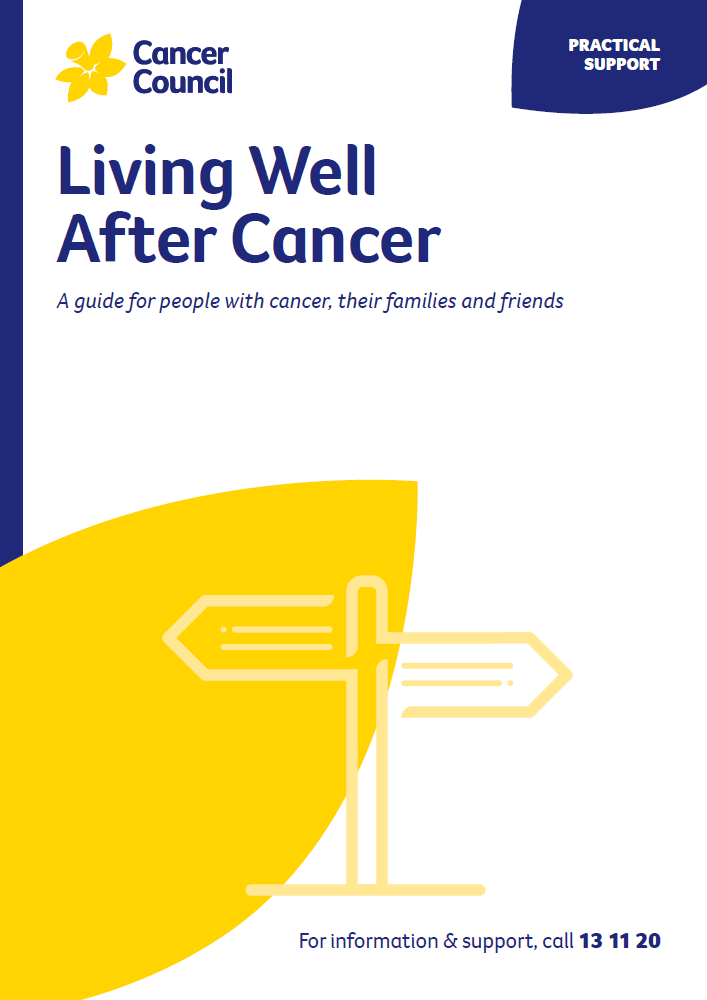- Home
- Ovarian cancer
- Life after treatment
Life after treatment
For most people, the cancer experience doesn’t end on the last day of treatment. Life after cancer treatment can present its own challenges. You may have mixed feelings when treatment ends, and worry that every ache and pain means the cancer is coming back.
Learn more about:
- Overview
- Follow-up appointments
- Having CA125 blood tests
- Dealing with feelings of sadness
- Looking after yourself
Overview
Some people say that they feel pressure to return to “normal life”. It is important to allow yourself time to adjust to the physical and emotional changes, and establish a new daily routine at your own pace. Your family and friends may also need time to adjust.
Cancer Council 13 11 20 can help you connect with other people who have had ovarian cancer, and provide you with information about the emotional and practical aspects of living well after cancer.
For more on this, see Living well after cancer
Follow-up appointments
After your treatment ends, you will have regular appointments to monitor your health, manage any long-term side effects and check that the cancer hasn’t come back or spread. These are known as follow-up appointments and are times for you to discuss any concerns you may have.
In most cases, follow-up appointments will be with your gynaecological oncologist and sometimes the medical oncologist. They will usually perform a physical examination, which may include an internal examination, and arrange blood tests before each visit.
Scans such as CT or PET–CT may be arranged if you develop symptoms, your blood test detects a rise in the tumour marker or your doctor wants more information.
There is no set follow-up schedule for ovarian cancer, but it’s common to see a specialist every 3 months for the first few years, and then every 4–6 months for up to 5 years. Some people prefer not to follow a schedule but to see their specialist if they experience symptoms. Talk with your doctor about the right follow-up plan for you.
Your check-ups will become less frequent if you have no further problems, and the cancer has not come back. Between follow-up appointments, let your doctor know immediately of any symptoms or health problems.
When a follow-up appointment or test is approaching, you may find that you think more about the cancer and feel anxious. Talk to your treatment team or call Cancer Council 13 11 20 if you are finding it hard to manage this anxiety.
Having CA125 blood tests
Your specialist will also talk to you about the advantages and disadvantages of having regular blood tests for the tumour marker CA125. This test is optional.
There is research to suggest that waiting until new symptoms develop before starting treatment is just as effective as starting treatment earlier because of a rise in CA125. Not having treatment until you have new symptoms may mean that your quality of life is better for longer because side effects of further treatment are delayed.
For germ cell or stromal tumours, you may have blood tests for tumour markers other than CA125.
Dealing with feelings of sadness
If you have continued feelings of sadness, have trouble getting up in the morning or have lost motivation to do things that previously gave you pleasure, you may be experiencing depression. This is quite common among people who have had cancer.
Talk to your GP, because counselling or medication, even for a short time, may help. Some people can get a Medicare rebate for sessions with a psychologist. Cancer Council may also run a counselling program in your area.
For information about coping with depression and anxiety, call Beyond Blue on 1300 22 46 36. For 24-hour crisis support, call Lifeline 13 11 14.
The Thing About Cancer podcast
Listen to our podcast The Thing About Cancer for information and insights that can help you navigate through the challenges of living with cancer.
Looking after yourself
Cancer can cause physical and emotional strain, so it’s important to look after your wellbeing. Cancer Council has free booklets and programs to help you during and after treatment. Call 13 11 20 to find out more, or see Managing cancer side effects, Exercise after a cancer diagnosis, Complementary therapies, Emotions and cancer, Nutrition and cancer, Sexuality, intimacy and cancer, Fertility and cancer, and Living well after cancer.
Alternative therapies are therapies used instead of conventional medical treatments. These are unlikely to be scientifically tested, may prevent successful treatment of the cancer and can be harmful. Cancer Council does not recommend the use of alternative therapies as a cancer treatment.
→ READ MORE: What to do if ovarian cancer returns
Watch this video to see why eating well is so important after a cancer diagnosis, and what you can do to maintain a healthy diet.
Research shows that exercise benefits people with cancer during and after treatment. Find out more in this video or see our other exercise videos.
More resources
Dr Antonia Jones, Gynaecological Oncologist, The Royal Women’s Hospital and Mercy Hospital for Women, VIC; Dr George Au-Yeung, Medical Oncologist, Peter MacCallum Centre, VIC; Dr David Chang, Radiation Oncologist, Peter MacCallum Cancer Centre, VIC; Prof Anna DeFazio AM, Sydney West Chair of Translational Cancer Research, The University of Sydney, Director, Centre for Cancer Research, The Westmead Institute for Medical Research and Director, Sydney Cancer Partners, NSW; Ian Dennis. Consumer (Carer); A/Prof Simon Hyde, Head of Gynaecological Oncology, Mercy Hospital for Women, VIC; Carmel McCarthy, Consumer; Quintina Reyes, Clinical Nurse Consultant – Gynaecological Oncology, Westmead Hospital, NSW; Deb Roffe, 13 11 20 Consultant, Cancer Council SA.
View the Cancer Council NSW editorial policy.
View all publications or call 13 11 20 for free printed copies.

